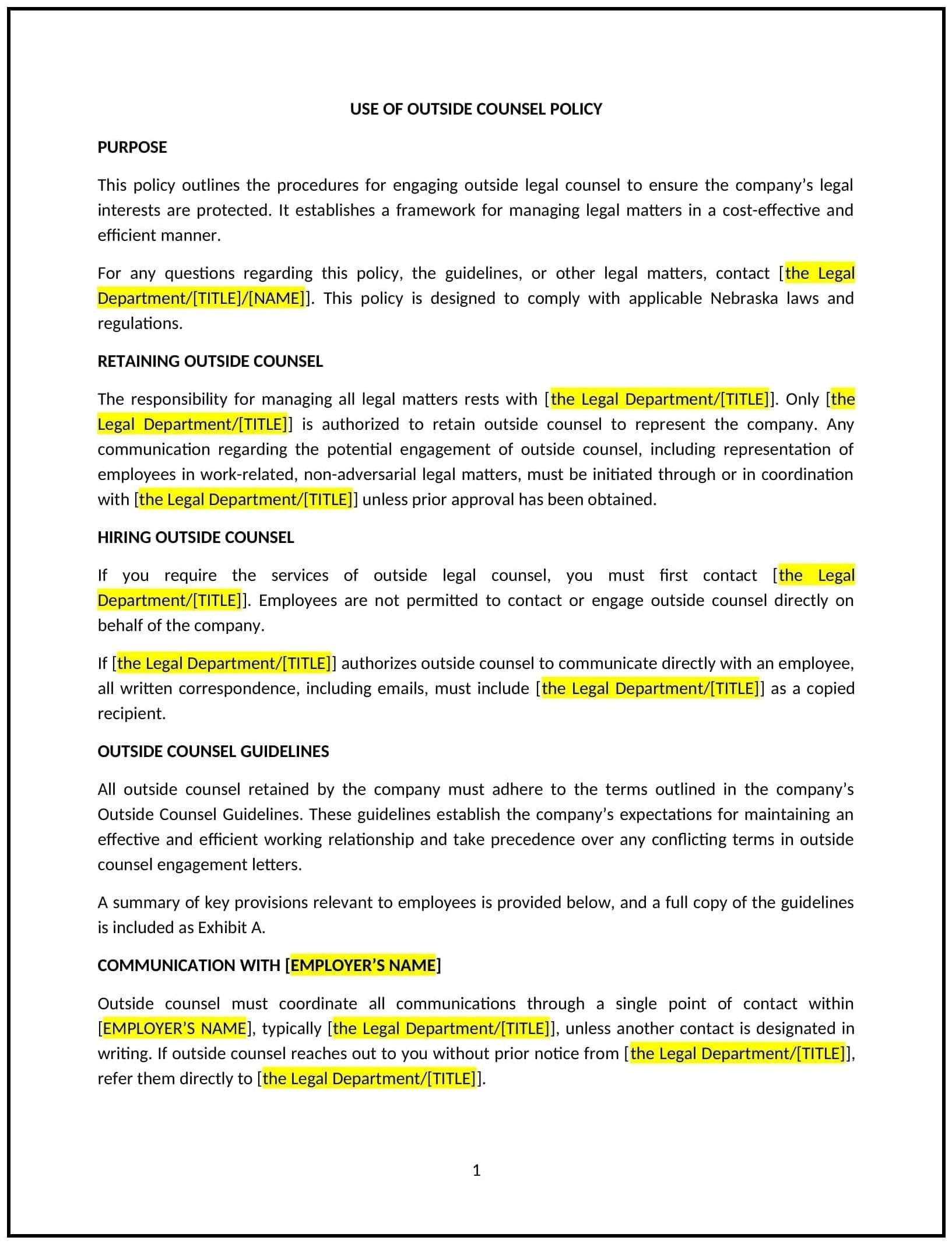Use of outside counsel policy (Nebraska): Free template
Got contracts to review? While you're here for policies, let Cobrief make contract review effortless—start your free review now.

Customize this template for free
Use of outside counsel policy (Nebraska)
A use of outside counsel policy helps Nebraska businesses establish guidelines for engaging external legal counsel to address specific legal matters. This policy is designed to ensure transparency, cost-effectiveness, and alignment with the business’s legal and strategic goals. By formalizing the process for selecting and working with outside counsel, businesses can manage legal risks, maintain control over legal expenses, and achieve favorable outcomes.
By implementing this policy, businesses in Nebraska can streamline legal processes, protect their interests, and demonstrate a commitment to sound legal practices.
How to use this use of outside counsel policy (Nebraska)
- Define outside counsel: Clearly explain what constitutes outside counsel and the types of legal matters they may handle, such as litigation, contracts, or regulatory compliance.
- Establish selection criteria: Outline the process for selecting outside counsel, including qualifications, expertise, and cost considerations.
- Set engagement terms: Provide guidelines for formal engagement agreements, including scope of work, fees, and communication expectations.
- Monitor performance: Define how outside counsel’s performance will be evaluated, including regular updates and feedback sessions.
- Address cost management: Specify procedures for approving legal expenses, tracking budgets, and ensuring cost-effectiveness.
- Communicate the policy: Share the policy with relevant stakeholders, including employees and outside counsel, to ensure awareness and understanding.
- Train employees: Educate staff on when and how to engage outside counsel in accordance with the policy.
- Review and update the policy: Periodically assess the policy’s effectiveness and make adjustments as needed to reflect changes in business needs or legal requirements.
Benefits of using this use of outside counsel policy (Nebraska)
This policy offers several advantages for Nebraska businesses:
- Promotes transparency: Clear guidelines help ensure that outside counsel engagements are managed openly and responsibly.
- Reduces legal risks: Formal processes for selecting and monitoring outside counsel minimize the likelihood of disputes or unfavorable outcomes.
- Controls costs: Setting engagement terms and monitoring expenses helps businesses manage legal budgets effectively.
- Aligns with Nebraska values: The policy reflects the state’s emphasis on fairness, accountability, and community trust.
- Enhances decision-making: Structured processes for engaging outside counsel lead to more informed and strategic legal decisions.
- Improves efficiency: Streamlined procedures for managing outside counsel save time and resources.
- Supports legal standards: A formal policy helps businesses align with applicable laws and regulations.
Tips for using this use of outside counsel policy (Nebraska)
- Communicate the policy effectively: Share the policy with employees and outside counsel to ensure clarity and understanding.
- Provide training: Educate employees on when and how to engage outside counsel in accordance with the policy.
- Conduct due diligence: Thoroughly vet outside counsel before engagement to ensure they meet the business’s standards and needs.
- Set clear expectations: Define the scope of work, timelines, and deliverables in engagement agreements to avoid misunderstandings.
- Monitor performance: Regularly review outside counsel’s performance and provide feedback to address any issues promptly.
- Document engagements: Maintain detailed records of engagement agreements, performance reviews, and communications with outside counsel.
- Review the policy periodically: Update the policy as needed to reflect changes in business needs, legal requirements, or industry standards.